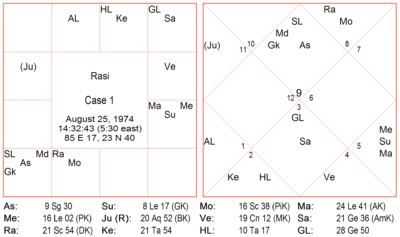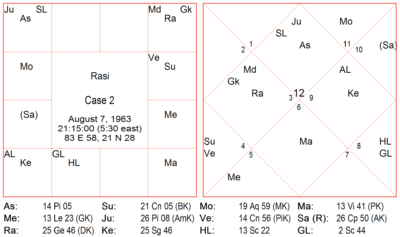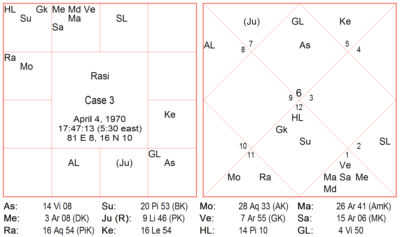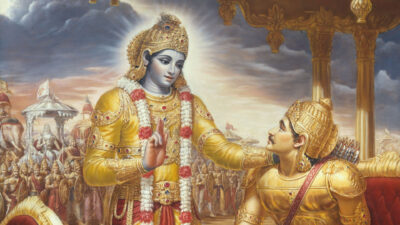Ekādaśa Bhāva
लाभभावफलाञ्चाथ कथयामि द्विजोत्तम।
श्रुयोताम् जातको लोके यछुत्भत्वे सदा सुखी॥
lābhabhāvaphalāṣcātha kathayāmi dvijottama |
śruyotām jātako loke yachutbhatve sadā sukhī ||
-Bṛhat Parāśara Horā Śāstra, Lābhabhāvaphalādhyāya, Sl. 1
“O the greatest among dvijas, I will now tell you about the results of Lābha Bhāva, which if auspicious (śubha) will make the native eternally happy”
The ekādaśa bhāva or the eleventh house of the rāśi chart represents the realization of the hope and desires, the dreams and aspirations of the lagna. The hope and aspirations of a person are his children who are seen from the fifth house of the natal horoscope. The 11th house is the fifth from the seventh house which is the seat of all desires and hence indicates the fulfillment of a person’s desires. It indicates elder brothers, friends, colleagues and the community of associates who guide the native in the fulfillment of these hopes and desires. In material terms, it is the wealth and riches that pour in which aid in the achievement of one’s dreams and aspirations. It is the karma of the house of wealth, therefore the source of inflow of the wealth or the bitta of the dhana bhāva. This inflow of wealth is known as income. It is the protection of mantra, being the dharma bhāva from the third house of guru upadeśa. It is the māraka for one’s mantra being the seventh from the fifth house of mantra, devotion and bhakti. It is not therefore unusual that the significator of this bhāva is Jupiter. It is a trika house, an upachaya, the house of punishment and the Hara sthāna. It is the house which indicates the potential growth of an astrologer through scholarship and through the ability to earn from this knowledge as it is the fourth from the eighth and as the eighth is the tenth from the eleventh house. It is above all, the bādhaka sthāna of the Kālapuruṣa, as it is lorded by Rāhu.
The hopes and aspirations of the seventh house is to get married and receive love; therefore a ruined fifth house can smash all hopes of marriage.
Lābha: Gains, Benefits, Incomes
The 11th lord is the lābha or the gains of the karma bhāva, karma which is performed in order to realize one’s hopes. The lābha does not come before the end of the karma just the way salaries are not paid till the month is completed. It is for this reason one sees income from the second house from the tenth, which is the dhana or the wealth from the tenth house. The third house from the tenth is the expenditure of the tenth bhāva. More importantly, it is the karma of the second house, being tenth from it; hence it shows the completion of the activity from which the wealth is formed. This activity is the in flow of income. It is therefore not difficult to understand that the parivartana and association of the second and the 11th lords form powerful dhana yogas in the chart. Parāśara and the other ṛṣzis tell us that the 11th lord, well placed and in strength specially in its own house, in a kendra or trine, in exaltation and in its own sign, will yield tremendous amounts of wealth. The 11th lord in the 11th house in particular will increase the wealth and happiness of the native day by day. Depending on the house in which the 11th lord is placed in, the native will gain in wealth from the people represented by the kārakatva of the house. For example, the 11th lord in the seventh house will enable the native to gain from his wife’s relatives, in the third house from his brothers and in the fourth house form his mother and maternal relatives and through land and property. The 11th lord in the fifth house will make a person’s children happy and learned; while in the ninth will confer gains to the native through a rise in his fortunes and make the native a truthful and honorable man. Parāśara says the 11th lord in lagna makes a person sātvik as the lagna governs one’s ideals and principles. The 11th lord’s presence in the rising sign will ensure that the in flow of income is through honest means.
The 11th lord in the fifth will also yield wealth through speculations as the ārūḍha of the 11th house will fall in the eighth house. In case of the 11th lord being in the ninth house, the ārūḍha will be in the seventh house, so it might indicate a rise in fortune through or after marriage.
The 11th lord shows the physical direction from where the lābha will come. Travel in the direction of the lord of the 11th house will yield lābha. Sāravalī tells us to worship the deity first before proceeding for lābha. So if one worships the deity associated with the physical direction, especially the dikpālaka, one will get success. When such a dikpālaka is happy, there will be gains and the realization of hope.
Chart 1: Case 1: The Direction of the 11th Lord


In the example given in Chart 1 the native has 11th lord Venus in the eight house of loss and debt which he had incurred huge debts as due to the early demise of his father, he had taken enormous loans from his relatives to pursue his education. The native’s family that is his mother and two brothers were not financially well disposed. Venus however is beautifully placed in digbala from the Ārūḍha Lagna indicating that traveling in the direction of Venus will give him gains. Venus mahādaśā started in 1998 and he immediately left his home town Calcutta for a small town in the westerly direction where he started working in an NGO. He encountered his first Upapada which did not reach any culmination and he traveled further in a northwesterly direction to New Delhi, where he was employed in an excellent software company in the marketing of software. The pay was definitely better than what an NGO could offer him, but it was not enough to make him debt free. Soon after, his employers send him to Singapore which is in a south easterly direction, the direction of Venus. All these events occurred in Venus-Venus. Once he went to Singapore, his world opened up before him as he succeeded professionally and earned very well. This made him debt free and enabled him to look after his family which included a widowed mother and two brothers. After the completion of his contract in Singapore he was posted in Brunei in the same south easterly direction where he was elevated to the position of project leader and earned extremely well. Thereafter the native tried desperately to be posted back in Calcutta to be near his family and Puri so that he would be able to pursue jyotiṣa; however he was posted back to Singapore. Subsequently his two brothers got married and thereafter his marriage was finalized and the native married in Venus-Mars, Mars being his Ātmakāraka aspecting the UL. Traveling in the direction of the 11th lord, especially when it has digbala from the Ārūḍha Lagna, gave a tremendous rise in his income, comforts and luxuries and also gave him marriage, as all this occurred in Venus dasa. However, since Venus is also the sixth lord in the eighth, in the antara daśā of the eighth lord Moon, the native suffered from śukra related disease in body part indicated by the eighth house. This was because the native was attempting to practice abstinence as Venus in the eighth house triggered his sādhu yoga and the desire to renounce the world.
Chart 2: Case 2: Travel in the Direction of the 11th Lord

Chart 3: Case 3: Travel in the Direction of the 11th Lord

Phala: Fruits of Bhāvas
The 11th house denotes the phala or fruits of any bhāva or activity. The fifth is the 11th from the seventh, denoting the fruits of vivāha karma or marriage, which in the classical sense are children.
The 11th from the tenth house shows karma phala. This falls in the eighth house of transformation and is directly linked to the karma a person does. Except for a few tangible phalas, one cannot measure the phala of the karma of the tenth house, without casting a praśna or a puṇya chart or examining the ṣaṣṭiāṁśa. The true karma yogi works without expectation of any phala. This is known as niṣkāma karma, which too is extremely difficult to quantify. Niṣkāma karma is the ideal way to perform actions as taught by Kṛṣṇa to Arjuna in the Bhagavat Gītā:
कर्मण्येवाधिकारस्ते मा फलेषु कदाचन।
मा कर्मफलहेतुर्भूर्मा ते सङ्गोस्त्वकर्मणि॥
karmaṇyevādhikāraste mā phaleṣu kadācana |
mā karmaphalaheturbhūrmā te saṅgostvakarmaṇi ||
-Bhagavat Gītā, Sāīṁkhyayoga, Sl. 47

Translation: You have a right to karma; not to its phala or the fruit. Hence do karma. But you should never be attracted to the fruits of the karma, because the desire for karma phala becomes the reason for striving for the fruits of karma. Hence do not become the casue or the channel of attaining karma phala. However, neither should you shirk karma.
[1] Paper presented in the International Conference on Vedic Astrology, Novi Sad, Serbia, 10-16 July, 2005.

0 comments